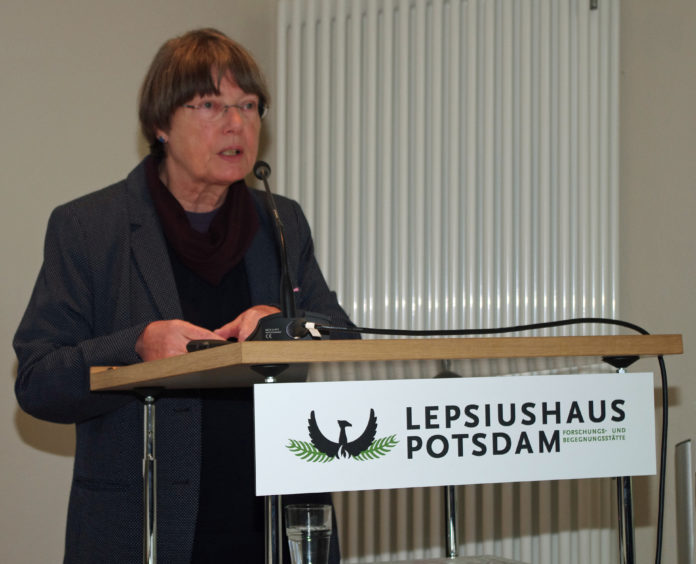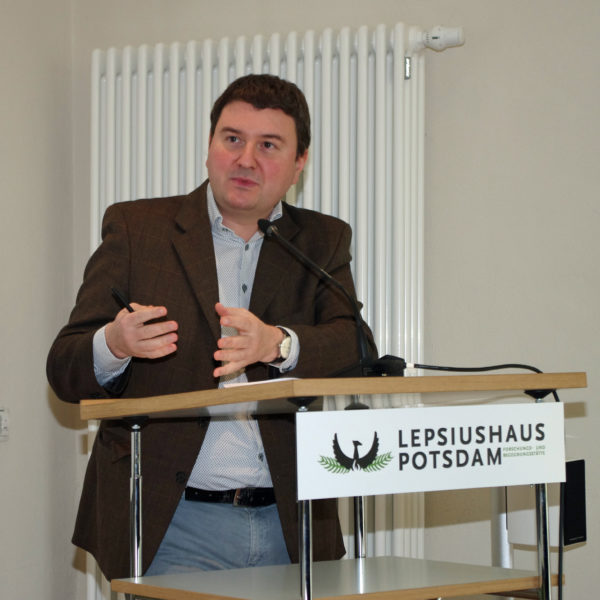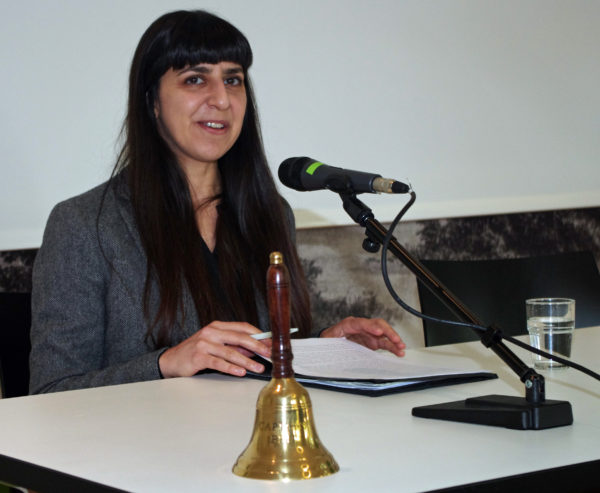
Dr. Angela Moré
Genocide and Denial: The Human Dimension
by Muriel Mirak-Weissbach
POTSDAM, Germany, NOVEMBER 17, 2022— Scholars and human rights proponents who came together earlier this month for a conference on “Genocide and Denial,” were continuing a discussion process begun in January this year. As Lepsiushaus director Dr. Roy Knocke recalled, the first conference, addressed by Prof. Taner Akçam and German Holocaust historian Wolfgang Benz, dealt with the denial of the Shoah and the Armenian Genocide as viewed from the historical perspective, whereas the second session would “develop the theme further, from a philosophical, sociopsychological and juridical perspective, with reference to human rights practice.” As referenced last week, all these aspects were treated in depth by experts. (See story in last week’s issue.) To do justice to all the presentations would require far more than an article, and what follows is a summary report. It is hoped that the papers will be published in the near future.
The Discrete Individual
If understanding the juridical aspects of genocide denial is crucial to effective action by human rights proponents in the pursuit of justice, grasping the nature of the social and psychological dimension of the phenomenon is vital to appreciating the human experience. Genocide involves entire populations and cultures, but it is perpetrated by individuals and they destroy the existences of individuals. How can one explain the mind of a perpetrator who denies his criminal actions? And, how may one access the emotional impact on the survivors and their progeny?
Dr. Angela Moré, professor of social psychology at Leibniz University, Hannover, offered profound insights into these questions in her talk on “Denial of Crimes against Humanity: Motives, Mechanisms and Consequences.” Among the defense mechanisms defined by psychoanalysis, denial serves to protect the ego from feelings of shame, fear and guilt, and it does this by creating constructs; in the attempt to deny a past deed, one creates an alternative version of events, as in an alibi or an outright lie. (Interestingly, in German the words for denial and lie, Leugnen and Lügen, are etymologically linked, sharing the same root.) For example, a German World War II veteran, who had told his family he had been a prisoner of war in Siberia until 1949, actually had been released from an English prison in 1945, where he was serving time for car smuggling. The lie about Siberia served to protect him from the shame associated with his own criminal act, while also eliciting recognition and sympathy.
Or, denial may function as a form of dissociation; here one eliminates any empathy for the victim, by depriving him of his humanity. Moré cited the example of a Nazi SS member who proudly boasted of his executions of Jews with the construct that, if not eliminated, those victims could have done the same to his offspring. A group dynamic denoted as a “Soldier-Matrix” refers to perpetrators who experience their own brutal actions with feelings of superiority and power. Having denied the humanity of their victims, they end up destroying their own humanity.
Some perpetrators, Moré reported, might attempt to repair for their crimes, once returned to civilian life, but others would not. On the contrary, as amply documented in accounts of war crimes trials against Nazi perpetrators, they would flatly deny any wrongdoing, and, bound together in a sort of “sworn community,” rely on one other to hold up the lie. Furthermore, as an expansion of this phenomenon socially, significant layers of the civilian population would claim they had had no inkling of what had been laid bare in the war crimes tribunals.

Dr. Roy Knocke
Turkey and the Armenian Genocide
After presenting the evidence regarding post-war Germany’s mode of dealing with its Nazi past, including defense mechanisms and attempts to minimize or deny events, Moré moved to consideration of how the Armenian genocide is viewed. She stated that “in Turkish society, even after the fact and to the present day, there has been a removal of the persecution and a denial of the systematically planned and executed expulsions and killings,” even though this has been refuted by the longstanding consensus on the part of the international scientific community. Instead of the historical record, since Mustafa Kemal’s founding of the Turkish republic, the dominant narrative has been that all sides suffered, all sides had victims and perpetrators, so no need for anyone to take responsibility for the crimes of the Committee of Union and Progress.
Treating denial as the last stage of genocide, Moré reviewed points made by several researchers regarding the intention to erase memory and remembrance, as well as to destroy witnesses’ reports and cultural remains, which Henry Rousso dubbed “Negationism.” The fact that the perpetrators were not punished is itself a form of denial. Although trials were held in post-war Turkey, under Allied pressure, and criminals were convicted, very few death sentences were carried out, and the genocidal character of the measures was denied soon after the Lausanne Treaty. Article 301 of the Turkish penal code testifies to the fact that even mention of the genocide is considered a “national insult.” This fact leads to consideration of the thesis that nations seeking to exclude “others,” even by resorting to genocide, themselves suffer from an identity crisis; the Young Turk regime, seen in this light as politically insecure, engaged in projection of its own fears and dangers onto the Armenians, especially the intellectual elites. Psychologically this betrays “a problem of its cultural envy, which is accompanied by existential insecurity, a sense of inferiority and fears of loss, even to the point of — fantasized or real — fear of being eliminated.”
With reference to Freud’s concept of the “uncanny,” Moré explained the process whereby denying criminal acts while placing the blame on the victims leads to creation of a vicious circle. As a result of an unconscious dynamic of projective identification, the identity crisis of the perpetrator remains, and with it the need for defense mechanisms. In addition, both sides, perpetrators and victims, along with their descendants, remain locked in a negative clinch. This, for Moré, “is the central unconscious function which the victims or victims are supposed to take on; they are to become the container as well as the grave of the insecure self-image and the negative parts of the self of the perpetrators or group.” This is linked to a perversion of the perpetrator-victim relationship, in that, if genocide survivors may develop so-called survivors’ guilt, perpetrators may tend to consider themselves victims.

Dr. Melanie Altanian
Denial across Generations
For descendants of genocide survivors certainly the most intriguing aspect of this psychological analysis deals with transgenerational consequences of denial. Moré cited the work of Melanie Altanian (who also spoke at the conference), and her concept of “epistemic injustice.” This refers to the injury to genocide survivors’ descendants: denial robs them of confirmation of their own identities, because it casts doubt on their family history. In the extreme this may create feelings of helplessness, and even fears of insanity. For the descendants, it means calling into question the veracity of tragic and painful events related by parents or grandparents, to the point that one feels obliged to provide proof.
Not to be forgotten is the phenomenon of silence, characteristic of those who survived the genocide as well as their progeny. For the latter, there is often an inkling of what had occurred, or at least, that something had occurred, but, as Moré said, “it was impossible for any exchange to take place.” One could not talk about it. This applies also to descendants of those Armenian survivors, mainly girls and women, who were converted to Islam by force and married. What, if any, inkling do they have of another identity? Here she noted the growing literature including biographical and autobiographical accounts of descendants, beginning with Fethiye Çetin’s bestseller My Grandmother. And she closed by stressing the immense value of such accounts by those who were witnesses to the genocide: theirs is lived history, history in the small, in the discrete individual person.